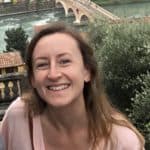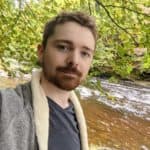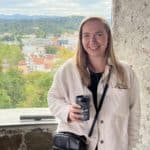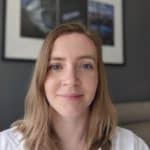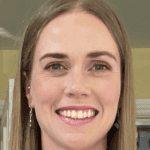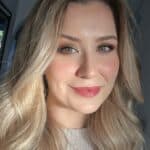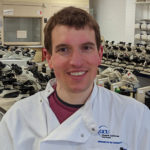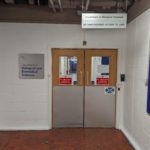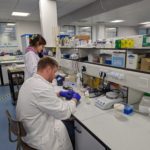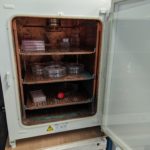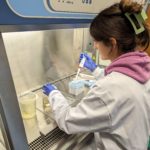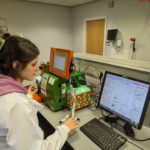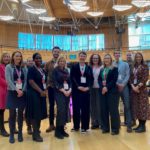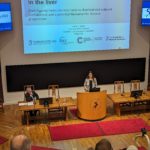Profile
Tim Humpton
-
About Me:
I’m an American cancer researcher that has lived in Glasgow for over 10 years, not that you’d know it from my accent! I enjoy cycling, bake lots of bread, and sometimes miss watching American Football on TV.
-
Read more
I grew up on the East Coast in the US and did my undergrad there. I’ve always been interested in chemistry and maths, and started at uni studying Chemical Engineering as a result. However, some great hands-on experiences in a research lab got me hooked on molecular biology. I added a degree in Bio, and haven’t looked back. After graduation, I knew that I wanted to see something else in the world–either in sunny California or somewhere else in the world. I took an opportunity to pursue a PhD in Biochemistry in the UK even though it wasn’t sunny or warm because it seemed like a great solution. 10 years on from finishing my PhD, I haven’t left! Now, I do research into how we can use drugs to prevent cancer, and I also teach as a university lecturer.
I’m a competitive person, and although I used to get my sports fix through soccer/football and track and field (athletics) when I lived in the US, these days my main outlet for exercise is competitive cycling, both IRL and in virtual / online competitions.
-
My pronouns are:
he/him
-
My Work:
I am a cancer researcher aiming to repurpose existing cancer treatments to prevent cancer from occurring in the first place.
-
Read more
In work, my time is divided between doing research and teaching undergraduate and graduate-level courses in biological and biomedical sciences.
On the research side, I am the leader of a small research group that includes a PhD student, a post-doctoral researcher (someone doing research as a job after getting a PhD), a research technician (same as a post-doc but without a PhD), and myself. Together, the group does experiments using cell lines and disease models to try and discover new things about the causes of cancer. Any new knowledge that we uncover helps us develop new plans of attack on cancer cells. Hopefully, some of our work will get published in scientific journals and lead to clinical trials for cancer prevention in humans. We also present our findings at scientific conferences, talking with other scientist and clinicians about the potential use of our findings. A few times, I have also had the opportunity to engage with policy makers at Holyrood.
On the teaching side, I teach undergraduate students (mostly 3rd and 4th years) and Masters-level students within my university department. The topics are fairly wide-ranging, but mostly focused on aspects of human health and on the underlying biology and chemistry that allows our bodies to function normally. In some modules, I teach about different diseases (mostly cancer, diabetes, and liver disease) and how they are caused, identified by a GP, and current ways in which they are treated.
-
My Typical Day:
Main points of a typical day: oatmeal/porridge and coffee; research/experiment planning; PB and Banana sandwich + coffee for lunch; data analysis; lecturing and/or supervising research students; chats with research collaborators; home time.
-
Read more
I have four young kids (two boys and twin girls), so there isn’t really a ‘typical’ day. Something is always going on! I’m an early riser in the morning, and usually plan to do some exercise first thing. Breakfast is oatmeal with lots of coffee, probably supplemented with whatever cereal dregs the kids leave behind.
After the school and nursery runs, I’m into Uni for a mix of research and teaching that depends on the time of year / term-time or not. I have won funding to cover three main research projects at the moment. They are inter-related but use slightly different experimental techniques to address different main questions. To move these along, I do a lot of experiments myself. Luckily, I also have a ton of help from the people in my research team–a PhD student, a post-PhD (called a post-doc) professional researcher, and a research technician. You can see some of them working and/or presenting our findings at conferences in the photos.
Doing research actually takes quite a lot of planning and preparation. You need to figure out the main research question you are interested in examining, break this big idea down into smaller components that are testable, and then design experiments to actually find out the answer to your hypothesis. I spend a lot of my time doing these thinking / planning / strategising steps. But (hopefully) there’s still enough time left after all of that to do experiments with the group. That’s the best part!
I’ll have lunch at some point, usually a peanut butter and banana sandwich with more coffee. Often, it will be a ‘working’ lunch where I’ll try to take in a scientific talk or catch up with members of the research team.
At the end of the day, I cycle home, make or re-heat something for dinner, and then help grab the kids from nursery/after-school. Then it’s the bedtime bath/shower run, maybe a nighttime online cycle race, some wind down time, and then bed. Rinse and repeat!
-
What I'd do with the prize money:
I’d use the prize money to fund materials for an exhibition (at the Glasgow Science Festival or similar) focusing on green energy and carbon accounting. There is a lot that can be done through small choices: in diet, transportation, travel, and etc. and I think presenting this in a fun way, maybe as a carbon credit game could help inform about greener living.
-
Education:
I went to my local public high school near Jamison, Pennsylvania in the US where I’m from. After graduating, I did my undergrad at the Massachusetts Institute of Technology (MIT) in Cambridge, Massachusetts. From MIT, I moved abroad and trained for a PhD at the University of Cambridge in the UK. I was part of Corpus Christi College, but that matters much less for a PhD than for undergrad. Then, my training/education in scientific research continued during an ~7-year post-doc place as a researcher at the CRUK Beatson Institute in Glasgow, Scotland.
-
Qualifications:
Stating the obvious: It’s a different system in America…
In high school I was first in my class of ~500; scored 2380 on the short-lived 3-part SATs (1580 on the ‘classic’ 1600 version) and earned extra college credits from scoring highly on 10 Advanced Placement (‘AP’) exams.
At MIT I earned two degrees: A Bachelor of Science (at MIT called an ‘SB’ degree from Scientiae Baccalaureus) in Chemical-Biological Engineering and a second SB in Biology.
From Cambridge I received a PhD in Biochemistry.
-
Work History:
In high school, I worked weekends and for portions of the summer as a pretzel baker. Very early mornings, and hot in the summer, but otherwise good fun.
My first ‘science-related’ job was a summer internship working in technical service at an adhesives manufacturing plant (a ‘glue’ factory). This is when I thought I wanted to be a chemical engineer.
While at MIT, I spent extra time as an undergraduate researcher in two big cancer-focused research labs, but didn’t otherwise really work during term-time. The academic work load (‘problem sets’, exams, finals) was 24/7 as it was. One summer I worked at the glue factory. Two of the others I was selected to be a research intern in a biology research lab studying deadly viruses. It was near to home and was **paid**. What more could you ask for!?
After that: Does doing a PhD count as work? (yes, yes it does.)
After my PhD, I interviewed for two different post-doc research positions in the hope of continuing my academic research career as a ‘professional’. I was unsuccessful with the first interview, but happily accepted a position at the CRUK Beatson Institute in Glasgow. I remained there for 7+ very happy and mostly productive years (mid-2014 to end 2021) (with a bit of time at the Francis Crick Institute in London thrown in at the end).
At the end of my post-doc, I applied for many big ‘start your own research group’ fellowships. These are put out semi-regularly by the biggest funders in the UK, are insanely competitive, but are also a massive opportunity to start an independent research career. I made the interview stage for two of these grants, but was ultimately unsuccessful in getting a pure / 100% research lab.
However, at the same time, I also applied for combined research + teaching positions and happily was offered a lectureship at Glasgow Caledonian University. I’ve been at GCU now for 2 years, slowly accumulating research funding, building a lab, and learning how to teach.
-
Current Job:
I’m a Reader in Biological and Biomedical Sciences. In this position, my time is split roughly 70/30 between 70% research and 30% teaching, but this is a sliding scale depending on how much research grant funding I have.
-
Employer:
Glasgow Caledonian University.
-
My Interview
-
How would you describe yourself in 3 words?
aspiring cancer preventer
What did you want to be after you left school?
I'm a lecturer, did I even ever leave school? Probably an astrophysicist, but it turns out that I don't have the maths ability.
Were you ever in trouble at school?
Rarely. Does driving to/from school count? I had a few issues with speeding. And a minor fender bender in the high school parking lot. Better driver now...
If you weren't doing this job, what would you choose instead?
I nearly went to Le Cordon Bleu in Paris after my PhD, so I'll choose haute cuisine and patisserie.
Who is your favourite singer or band?
I'll pick CHVRCHES, but Spotify would add Halsey and Taylor Swift to the mix. I'm basic.
What's your favourite food?
peanut butter
If you had 3 wishes for yourself what would they be? - be honest!
1. be wolverine from x-men; 2. develop a cure for cancer; 3. run a sub 4-minute mile
Tell us a joke.
What's red and bad for your teeth? A brick.
-

